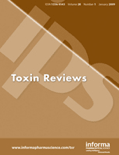
Toxin Reviews
Scope & Guideline
Pioneering Insights in Toxicology Since 1982
Introduction
Aims and Scopes
- Toxicological Mechanisms:
Research exploring the mechanisms by which various toxins affect biological systems, including cellular pathways and biochemical interactions. - Environmental Toxicology:
Studies assessing the impact of toxins on ecosystems, including pollution assessments and the effects of contaminants on flora and fauna. - Health Risk Assessment:
Evaluations of the potential health risks associated with exposure to various toxins, including epidemiological studies and risk modeling. - Bioremediation and Detoxification Strategies:
Innovative approaches for detoxifying contaminated environments or organisms, including the use of biological agents to mitigate toxic effects. - Phytochemical and Natural Toxin Studies:
Investigations into plant-derived toxins and their potential therapeutic applications, as well as their roles in pest management. - Nanotechnology in Toxicology:
Research on the application of nanomaterials in the detection and removal of toxins, as well as their own toxicological profiles. - Public Health and Policy Implications:
Analysis of the implications of toxin exposure on public health, including the formulation of guidelines and policies to mitigate risks.
Trending and Emerging
- Microbial and Probiotic Applications:
An increasing trend in studies focusing on the use of probiotics and microbial agents to detoxify harmful substances, showcasing a shift towards biological solutions. - Nanotoxicology:
Growing interest in the toxicological effects of nanomaterials, as well as their potential applications in toxin detection and remediation, reflects the advancements in nanotechnology. - Environmental Health and Safety:
A surge in research addressing the intersection of environmental toxins and public health, particularly concerning pollutants and their epidemiological impacts. - Phytochemical Research:
Heightened exploration of plant-derived compounds for their detoxifying properties and potential health benefits, indicating a resurgence in interest in natural products. - Emerging Contaminants:
Focus on new and previously unregulated contaminants, such as microplastics and pharmaceuticals in the environment, signaling a shift in research priorities to address modern pollutants. - Systematic Reviews and Meta-Analyses:
An increase in systematic reviews and meta-analyses indicates a trend towards comprehensive evaluations of existing literature, supporting evidence-based practices in toxicology.
Declining or Waning
- Traditional Pesticide Studies:
Research specifically focusing on traditional pesticides has decreased, possibly due to the increasing emphasis on integrated pest management and biopesticides. - Single Toxin Characterization:
There has been a noted reduction in studies that focus solely on the characterization of individual toxins, as interdisciplinary approaches become more favored. - Historical Toxicological Assessments:
Research that primarily examines historical data or cases of toxin exposure without contemporary relevance has waned, as the field shifts towards more applicable and current studies.
Similar Journals

BULLETIN OF ENVIRONMENTAL CONTAMINATION AND TOXICOLOGY
Advancing understanding of environmental health.BULLETIN OF ENVIRONMENTAL CONTAMINATION AND TOXICOLOGY, published by SPRINGER, is a pivotal journal in the fields of Environmental Science, Toxicology, and Public Health. With a strong history of dissemination since its inception in 1966, the journal predominantly focuses on the latest advances in understanding environmental contaminants and their toxicological effects on health and ecosystems. It currently holds a respectable Q2 ranking across multiple categories including Health, Toxicology and Mutagenesis, Medicine (miscellaneous), and Pollution, as per the 2023 metrics. While the journal is not Open Access, it provides an invaluable platform for researchers, professionals, and students seeking to contribute to and stay informed on critical issues regarding environmental hazards and their implications. With an engaged community of scholars and practitioners, this journal continues to be an essential resource for addressing the pressing challenges of environmental contamination and its health impacts, guiding future research and policy decisions.

Journal of Xenobiotics
Connecting global minds on pollution and pharmacology.Journal of Xenobiotics, published by MDPI in Switzerland, is an esteemed open-access journal dedicated to advancing the understanding of xenobiotic substances and their impact on environmental health and biological systems. Since its inception in 2011, the journal has made significant strides in the field, earning a prestigious Q1 ranking across categories such as Pharmacology, Pollution, and Toxicology in 2023, showcasing its pivotal role in disseminating high-quality research. With its recent Scopus rankings reflecting a solid position in Environmental Science and Pharmacology disciplines, the journal serves as a vital platform for researchers, professionals, and students interested in the mechanisms and consequences of pollutants and toxic substances in various settings. The Journal of Xenobiotics continuously fosters open collaboration and knowledge exchange, allowing for inclusive dialogue on contemporary issues, making its articles readily accessible for the global scientific community.

Toxicon-X
Pioneering Research for Environmental and Human HealthToxicon-X is a prestigious journal published by ELSEVIER, specializing in the dynamic field of toxicology. With an impact factor indicative of its excellence and rigor—ranked Q1 in Toxicology as of 2023, and positioned at #40 out of 133 in Scopus's Pharmacology, Toxicology, and Pharmaceutics category—this journal is a vital resource for researchers, practitioners, and students alike. Since its inception in 2019, Toxicon-X has embraced an Open Access model, enhancing accessibility and transparency of research findings. This ensures that crucial studies on toxic agents and their effects reach a broader audience, driving advancements in public health and safety. The journal is based in the United Kingdom and caters to a diverse international readership, with its scope encompassing novel research, reviews, and insights into emerging toxicological challenges. As we move towards the 2024 convergence year, Toxicon-X remains committed to fostering a deeper understanding of toxic substances, their mechanisms, and implications for human and environmental health.
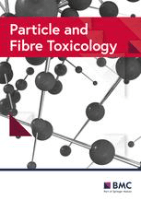
Particle and Fibre Toxicology
Pioneering insights into particulate and fiber toxicity.Particle and Fibre Toxicology is a leading open-access journal dedicated to advancing the field of toxicology, specifically focusing on the health impacts of particulate matter and fibers. Published by BMC since 2004, this journal operates from its offices in the United Kingdom and has gained significant recognition in the scientific community, achieving an impressive impact factor that highlights its relevance and influence. As indicated by its Q1 ranking in various categories including Health, Toxicology and Mutagenesis and Medicine (miscellaneous), it occupies a prestigious position in the academic landscape, appealing to researchers, professionals, and students alike. With a Scopus ranking of #4 in Toxicology and #7 in Environmental Science, the journal ensures high visibility and accessibility, providing a platform for the dissemination of key research findings and innovative methodologies in the interdisciplinary domains of toxicology. Through its commitment to open access, Particle and Fibre Toxicology fosters knowledge-sharing and collaboration, facilitating significant advancements in our understanding of the toxicological effects of environmental agents.

Frontiers in Toxicology
Navigating the Frontiers of Toxicological DiscoveryFrontiers in Toxicology, published by Frontiers Media SA, is a prominent open-access journal dedicated to advancing the understanding of toxicological science. Established in 2019, it serves as a vital forum for innovative research, offering insights into the pharmacological impacts and toxicological profiles of various substances. With its international reach based in Switzerland, this journal has quickly ascended in the academic community, achieving a notable Q1 ranking in Pharmacology, Toxicology and Pharmaceutics (Miscellaneous) and a Q2 ranking in Toxicology as of 2023. The journal is indexed in Scopus, where it ranks #8 out of 43 in its primary category, underscoring its influence and relevance in the field. The scope encompasses cutting-edge studies on the mechanisms of toxicity, including both human and environmental impacts, making it an essential resource for researchers, professionals, and students alike. By promoting open access to high-quality research, Frontiers in Toxicology plays a crucial role in enhancing knowledge sharing and fostering collaboration across disciplines.

Current Research in Toxicology
Pioneering Insights in Toxicology ResearchCurrent Research in Toxicology is a pioneering journal published by ELSEVIER that serves as a vital platform for disseminating cutting-edge research in the field of toxicology, spanning from biological impacts to pharmacological applications. With an ISSN of 2666-027X and an impressive Q2 ranking in key categories such as Applied Microbiology and Biotechnology, Health, Toxicology and Mutagenesis, and Toxicology, this journal underscores its commitment to high-quality research and significant contributions to the scientific community. Based in the Netherlands, Current Research in Toxicology aims to bridge the gap between academia and industry by providing rigorously peer-reviewed articles that cover a wide array of topics including novel methodologies, regulatory challenges, and emerging trends within the domain. The journal is accessible through various platforms, making it essential for researchers, professionals, and students eager to stay updated on the latest findings and advancements in toxicology. With a comprehensive focus on integrating theory with practical application, this journal is poised to influence future studies and policies in health and environmental science.
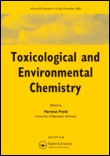
TOXICOLOGICAL AND ENVIRONMENTAL CHEMISTRY
Exploring the impacts of pollutants on our environment and well-being.TOXICOLOGICAL AND ENVIRONMENTAL CHEMISTRY is a pivotal journal published by Taylor & Francis Ltd, addressing critical intersections between environmental chemistry and toxicology since its inception in 1979. With its ISSN 0277-2248 and E-ISSN 1029-0486, the journal serves as a platform for rigorous research and innovative methodologies in pollution control, health implications of environmental chemicals, and the broader spectrum of toxicological studies. Although it currently does not offer open access, the journal's impact in the field is underscored by its Category Quartiles rankings in 2023, placing it in Q3 across Environmental Chemistry, Health, Toxicology and Mutagenesis, and Pollution categories. Furthermore, its Scopus rankings reveal its significant role within the scientific community, specifically in areas such as Environmental Science and Toxicology. The journal aspires to foster multidisciplinary dialogue and advance knowledge that contributes to environmental sustainability and public health, making it an essential resource for researchers, professionals, and students dedicated to these fields.
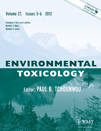
ENVIRONMENTAL TOXICOLOGY
Innovating Solutions for Environmental Health ChallengesENVIRONMENTAL TOXICOLOGY, published by Wiley, is a premier academic journal dedicated to the multifaceted study of toxic substances in the environment and their effects on human health and ecosystems. With the ISSN 1520-4081 and E-ISSN 1522-7278, this journal holds a prestigious position in the field, being ranked in the Q1 category across various relevant disciplines, including Health, Toxicology and Mutagenesis, and Management, Monitoring, Policy and Law. The journal regularly publishes high-quality research articles, reviews, and policy discussions aimed at understanding the implications of environmental toxins from 1980 to the present, contributing to the body of knowledge critical for the safety and sustainability of our environment. Researchers and professionals will find a treasure trove of information that not only highlights current trends and methodologies but also sets the stage for future advancements in toxicology. As a key resource, it provides valuable insights necessary for policy-making, environmental management, and public health, reinforcing its significance in the ever-evolving fields of toxicology and environmental science.
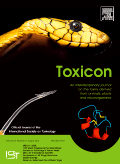
TOXICON
Innovative Insights into Toxicology and BeyondTOXICON is a prominent peer-reviewed journal dedicated to advancing the field of toxicology and its related disciplines. Published by PERGAMON-ELSEVIER SCIENCE LTD, this journal has been a crucial resource for researchers since its inception in 1962, with a focus on disseminating high-quality research until 2024 and beyond. TOXICON features comprehensive studies spanning the biochemical, biochemical, and regulatory aspects of toxology, making it essential for researchers, professionals, and students alike. With a current impact factor that places it in the Q3 category of Toxicology and a Scopus rank of 67 out of 133 in its field, it serves as a valuable platform for innovative findings and discussions. Although it does not offer open access options, TOXICON's rigorous editorial standards ensure that published work meets the highest scholarly criteria, thereby enhancing its contribution to toxicological science.
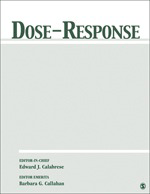
Dose-Response
Innovating the Study of Health Impacts in Environmental ScienceWelcome to Dose-Response, a premier open-access journal published by SAGE Publications Inc., dedicated to advancing the understanding of dose-response relationships in chemical exposure, health, toxicology, and public health. Established in 2003, this journal has quickly become an invaluable resource for researchers and professionals in the fields of public health, environmental science, and toxicology, boasting a commendable impact factor and a notable ranking in multiple categories, including Q2 in Public Health and Environmental and Occupational Health. With its converged years stretching from 2008 to 2024, Dose-Response aims to publish high-quality articles that contribute to the evaluation of health risks and benefits, ensuring that essential research reaches a global audience. Its open-access model provides unrestricted access to groundbreaking studies, fostering collaborative efforts among scientists and practitioners to inform policy and improve public health outcomes.